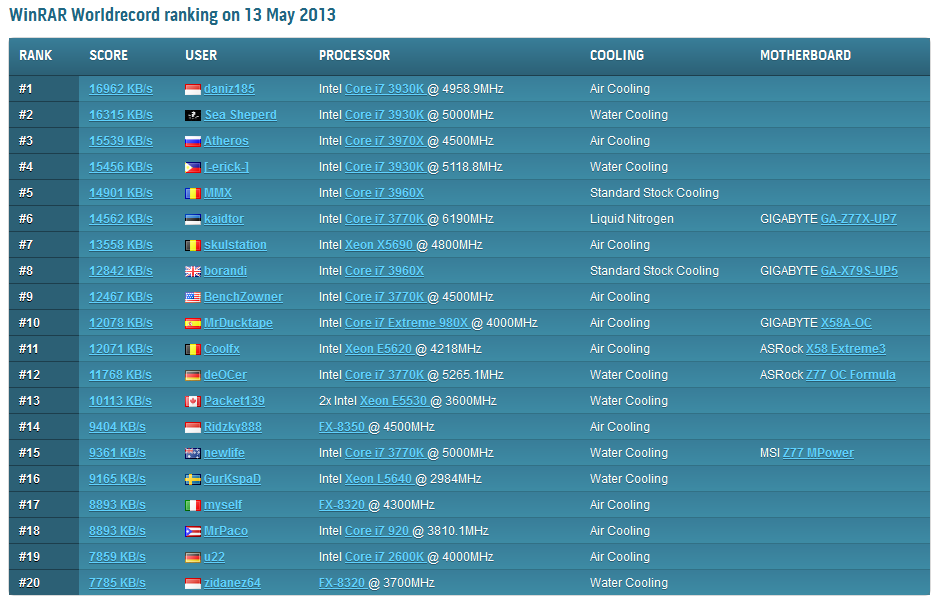Two New HWBOT Beta Benchmarks for Testing and Freestyle Overclocking: WinRAR and FryBench
Another quick news post to highlight the two new benchmarks we added to our database yesterday. The first benchmark is one that you all know: WinRAR. When you open the WinRAR application, go to the tools section and click on benchmark (short key is alt+b). For about 30 seconds, WinRAR will test the compression performance of your system. After the benchmark completes, you will find a resulting KB/s performance index highlighted in the WinRAR benchmark dialog box.
At the moment of writing, the database contains 58 benchmark results and has Daniz185 from Indonesia holding the #1 spot in the hall of fame with a Core i7 3930K clocked at 4960 MHz resulting in a score of 16962 KB/s.
Using "Benchmark" command you may compare performance of RAR compression algorithm on different computers.
This command generates random data, which contain specially introduced redundancy increasing load to processor and memory. Then data are passed through RAR compression and decompression algorithms and output of decompression algorithm is compared with source data. If any difference found, WinRAR reports "Errors found - Yes" in the command window. Such errors may indicate hardware problems like unreliable memory. Also WinRAR displays a size of processed data and compression speed, current and resulting, in kilobytes per second. You may use the resulting speed value to compare RAR performance in different conditions. For example, "Benchmark" command may be helpful, when you need to choose a new computer and wish to know which one will compress data faster. Only the general compression algorithm in "Best" mode with 4096K dictionary is called, all additional filters and algorithms are disabled, so it measures performance of core RAR compression on worst case like data.
Using "Multithreading" option you can compare performance of usual single threaded and multithreaded (optimized for multiprocessor architectures) versions of RAR compression algorithm. Depending on results, you can enable or disable multithreading in General settings dialog dialog.
It takes some time to fill the compression dictionary, which is empty in the beginning. Until it is done, the speed value is inconsistent, so the command window starts to display the current speed only a few seconds after activating. Resulting speed is displayed when at least 10MB of source data are processed, collected statistics is enough to get an accurate result and current speed changes are near zero. After the resulting speed has been set, it is not changed more. Though source data are random, their redundancy level and other parameters are always the same. So this command will report practically the same current speed regardless of execution time, provided that system load is not changing.
"Benchmark" command is never finished automatically, you need to cancel it manually. It does not use the hard disk, all operations are performed in memory.

The second benchmark we have added is probably a bit less known. It is an image rendering benchmark from 2011 and goes by the name of FryBench. The benchmark might be considered an alternative to Cinebench R11.5 as it scales in a similar way. The multi-socket processor platforms will rule the hall of fame without any doubt, but it should be interesting to see who and how grabs the lead in the consumer grade product categories. This benchmark does not seem to have a working homepage anymore, but you can freely download it from Guru3D.
At the moment of writing, the database contains 16 FryBench benchmark results and has Sea Sheperd from Switzerland holding the #1 spot in the hall of fame with a quad socket configuration of 4x Opteron 6276 clocked at 4000MHz resulting in a score of 1min 43sec.
The HWBOT staff hopes you enjoy the two additions to the benchmark suite. Who knows, perhaps the benchmarks will end up getting medals and points in the future!







Please log in or register to comment.